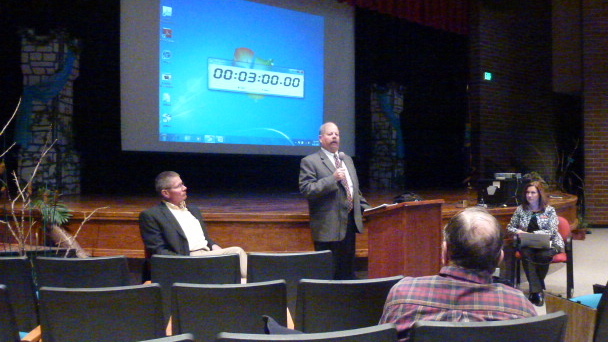Don Mitchell, a veteran Jerome School Board member, remembers the 2011 legislative session — when many Idahoans felt left out of the process of education reform, and cut out of the creation of the Students Come First laws.

On Thursday night, Mitchell looked at a largely empty middle school auditorium, and wondered why so few people showed up when they were given the opportunity to discuss education reform.
““I’m disappointed tonight,” Mitchell said. “How many of us are here tonight? Fifty, maybe?”
Mitchell may have been a bit generous with his crowd estimate. And only a handful of people testified Thursday, as Gov. Butch Otter’s Taskforce for Improving Education came to Twin Falls for a public forum. Scheduled to run for 2 ½ hours, the forum broke up after barely an hour.
The forum — the second of seven meetings planned statewide through the month of April — didn’t only draw a sparse public turnout. Just two representatives of the 31-member task force attended: task force chairman Richard Westerberg, a State Board of Education member who plans to attend all seven forums, and Roger Brown, an aide to Otter.
At one point, Westerberg was asked what the group is going to do with the comments they receive this month. The meetings are being recorded. And when the task force meets in Boise in early May, the public comments will be available for members’ review.
What came out of Thursday’s forum was a mixed bag.
- Task force members heard some more appeals for improved funding and questions about Common Core math and language arts standards — two recurring themes at the task force’s forum in Nampa on Wednesday.
- They heard from Josi Christensen, the mother of two Paul Elementary School students, who urged the state not to pick up funding of a pilot program that supplies every student in the school with an iPad. “It’s way too expensive, and it’s not practical.” Here, the public comment foreshadows an important decision facing the task force: technology funding. The 2013 Legislature earmarked $3 million for pilot programs in 2013-14, but the one-year expenditure, is designed to allow the task force the latitude to make long-term recommendations.
- They also heard an appeal, of a sort, for technology. Homer Henning encouraged the state to make better use of e-readers — so students won’t have to lug backpacks full of textbooks.
- They heard an appeal for back-to-basics curriculum. Adrian Arp of Twin Falls urged the state to reject teaching globalism, environmentalism and the “hoax” of global warming.
And even after Thursday’s session, the task force may not have heard the last word from Magic Valley residents. Idahoans can still submit comments via email at [email protected]
“Maybe people are more comfortable (commenting) online,” said Mitchell, after Thursday’s forum concluded. “Me, I like to get up and holler.”
